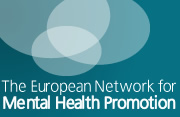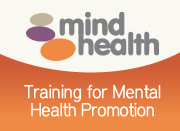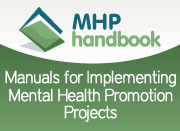Tools
- Utilities:
- Print this page
- Send this page
- Font size:
- Increase font size
- Decrease font size
Browse Database
Login, so as to add your own items.
-
Addressing Barriers to Learning: A Set of Surveys to Map What a School Has and What it Needs
15/05/2008
Surveys for 6 program areas and related system needs that constitute a comprehensive, multifaceted, and integrated approach to address barriers and thus enable learning. The areas are (1) classroom-focused enabling, (2) crisis assistance and prevention, (3) support for transitions, (4) home involvement in schooling, (5) student and family assistance programs and services, and (6) community outreach for involvement and support (including volunteers). Settings: Education
MHP Steps: Follow Up -
I Can Problem Solve [ICPS]
15/05/2008
ICPS serves as an effective violence prevention program by helping children think of nonviolent ways to solve everyday problems. ICPS has proven to be extremely effective in helping young children learn to resolve interpersonal problems and prevent antisocial behaviors. It is a self-contained program that involves the use of games, stories, puppets, and role plays to make learning enjoyable. Each lesson contains a teacher script, reproducible illustrations, and a list of readily available materials. Settings: Education
MHP Steps: Implementation -
Circle Time Solutions
14/05/2008
Circle Time is just one way of promoting Emotional Literacy in schools. It is mostly used in classrooms but the framework can be applied with groups at all ages, including staff. It is particularly helpful in preventing bullying and developing a more supportive ethos. Settings: Education
MHP Steps: Implementation -
Suicide Prevention in Schools, Best Practice Guidelines
14/05/2008
Best Practise guidleiness for suicide prevention in schools including postvention information. Developed by the Irish Association of Suicidiology. Settings: Education
MHP Steps: Follow Up -
Lifelines
14/05/2008
Lifelines is a school based suicide prevention curriculum comprised of four 45 minute lessson plans, targeted towards 12-17 year olds. Settings: Education
MHP Steps: Implementation -
Seasons for Growth
14/05/2008
A grief and loss Education Programme catering for young people aged 6-18 years. The core element of this programme is the promotion of social ad emotional wellbeing for young people who have experienced significant loss due to death or family breakdown. The programme aims to promote resilience, to enahnce coping and to develop lifeskills in young people. Seasons for growth is not a counselling programme but a grief and losss educational programme. Settings: Education
MHP Steps: Implementation -
Behind the Behaviour
13/05/2008
Behind the Behaviour looks at the role education professionals can play in dealing with emotional and behavioural problems in children and actively promoting their mental health. It shows new initiatives currently taking place in schools and ways of preventing children’s behavioural problems becoming longer-term mental health issues. You can use the video and booklet to stimulate discussion with colleagues, in a training session or in day-to-day professional life. Settings: Education -
STEPS for Well-being in Workplaces
13/05/2008
This short online tools can be used in WHP planning. It sets out 4 steps of WHP , preparation, planning, realisation and follow-up and evaluation. STEPS also contains an evaluation matrix covering, scores) for 1) employee health and well-being, 2)organisation and team functions, 3) professional skill development, 4) work and work environment and 5) organisation of workplace health promotion. Settings: Workplace -
Lets Respect
12/05/2008
The project aimed to produce a ‘toolkit’ primarily for healthcare staff who care for older people with mental health needs in acute hospitals. Let’s Respect is a campaign aimed at better meeting the mental health needs of older people, focusing initially on generic secondary care settings and the three most prevalent presentations – depression, delirium and dementia. Settings: Residence for Older People
MHP Steps: Implementation -
Improving Care for the End of Life: A Sourcebook for Health Care Managers and Clinicians
12/05/2008
A comprehensive guide on to how to enable quality improvement for end of life care within health care systems. Written for health care managers and clinicians, it offers practical advice that can help you improve quality in your hospital, hospice, nursing home, or other health care facility. Settings: Residence for Older People
MHP Steps: Follow Up | Needs Analysis



